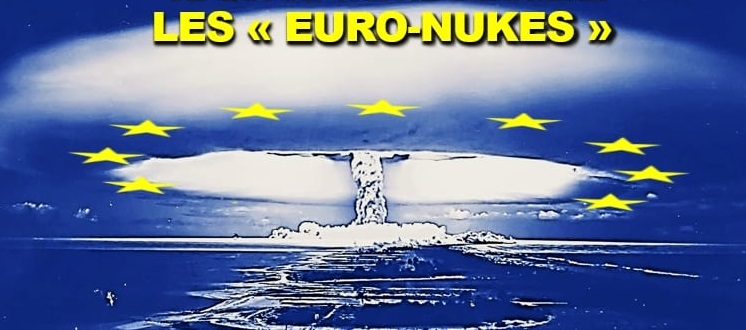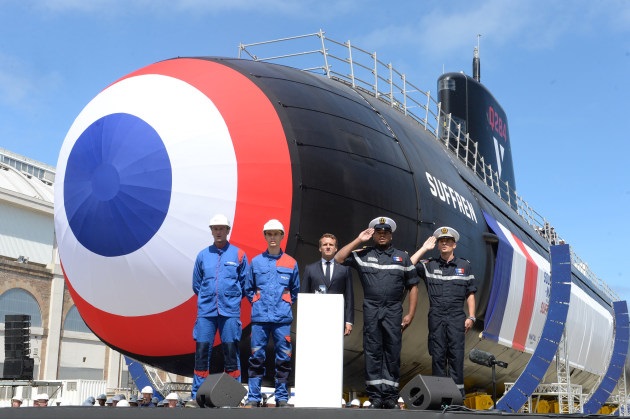
Are European countries ready to go nuclear? – asks international team of VOX media.
Just last week, after French President Emmanuel Macron floated the idea of European NATO members sending ground troops into Ukraine, Russian President Vladimir Putin warned Western leaders that Russia has “weapons that can hit targets on their territory” and that they were risking the “destruction of civilization.” The takeaway was unignorable: After years in which it was a largely forgotten political issue on the continent, the continent’s leaders clearly can no longer afford to ignore the threat of nuclear weapons.
The topic of nuclear deterrence is back in a big way, and has some European leaders to talking openly about whether their countries should acquire nuclear deterrents of their own — independent from a suddenly less predictable US.
Leaders in Poland, literally on the frontline of the conflict between NATO and Russia, have proposed hosting NATO nuclear weapons on their soil. Manfred Weber, a senior German politician who leads the center-right European People’s Party, the largest grouping in the EU parliament, recently argued for Europe to develop its own nuclear deterrent. He told POLITICO: “Europe must build deterrence, we must be able to deter and defend ourselves… We all know that when push comes to shove, the nuclear option is the really decisive one…”
There are already a large number of nuclear weapons on the continent. France and the United Kingdom both have arsenals of about 290 and 225 warheads respectively. The US also maintains an arsenal of around 100 warheads in Belgium, the Netherlands, Germany, Italy, and Turkey.
Russia has the world’s largest nuclear arsenal with more than 4,000 active warheads. Moscow has deployed nuclear-capable Iskander missiles to Kaliningrad, the Russian enclave between Poland and Lithuania, though it is not clear if there are actual nuclear warheads based there. But Russia has shown no signs that it is actually preparing to use its nuclear arsenal in Ukraine.
As for Europe’s own nuclear weapons, their value as a deterrent has less to do with their number or strength than the political structure in which they are embedded. Article 5 of the treaty that established NATO in 1949 states that “an armed attack against one or more [member country] in Europe or North America shall be considered an attack against them all” and that other members will assist the country that comes under attack, including by using military force. Therefore, even though most NATO member countries don’t have nuclear weapons, they benefit from the protection of being in an alliance with countries that do — the so-called ‘nuclear umbrella’.
Basing American nukes in Poland would undoubtedly be seen as a highly provocative move by Moscow, and critics contend that doing so would provide little military benefit, as such weapons would be more vulnerable to a preemptive Russian strike than those based deeper in Western Europe. The move would also violate the NATO-Russia Founding Act, an agreement from the 1990s under which NATO countries agreed not to base nuclear weapons on any new member states — although that may be a moot point these days given that Russia has also violated a number of its commitments under the agreement.
For now, that idea looks even more unrealistic, and Polish leaders have mostly stayed away from explicitly backing it. But a recent comment by Foreign Minister Radoslaw Sikorski during an appearance in Washington suggested it’s not entirely off the table. “If America cannot come together with Europe and enable Ukraine to drive Putin back, I fear that our family of democratic nations will start to break up,” Sikorski said at the Atlantic Council. “Allies will look for other ways to guarantee their safety. They’ll start hedging. Some of them will aim for the ultimate weapon, starting off a new nuclear race.”
It’s not just Moscow that has Western European countries rethinking nuclear deterrence — it’s Washington as well. The debate over “Euronukes” is not new, but recent events have given it greater urgency. “The French have been talking about this since the ’90s,” said Heather Williams, director of the Project on Nuclear Issues at the Center for Strategic and International Studies. “What’s different now is a couple of things. The first thing that’s different is that there is a war going on in Europe. The second thing is Donald Trump.”
It’s not hard to understand why. Trump is an outspoken critic of defense guarantees in general, which he argues encourages free-riding and reckless behavior by allies at America’s defense, and NATO in particular. As president he discussed pulling the US out of NATO altogether and onetime advisers like former national security adviser John Bolton have said he would likely have done so if he had been reelected in 2020.
Last year, Congress passed legislation preventing a future president from pulling the US out of the alliance without congressional approval, but that wouldn’t prevent Trump from simply refusing to fulfill US obligations under the alliance, including Article 5. During a meeting in 2020, Trump reportedly told European Commission President Ursula von der Leyen, “You need to understand that if Europe is under attack, we will never come to help you and to support you.” More recently, he has said he would let Russia “to do whatever the hell they want” to European countries that were “delinquent” by not meeting their NATO-mandated 2 percent of GDP defense spending targets.
In light of this, the old Cold War question has returned. “If there were to be President Trump back in the White House next January, and if we [Europeans] were to ask ourselves the question, ‘Is Trump going to risk Chicago for Berlin?’ I think it would be quite difficult to answer that question except in the negative,” said Nick Witney, a defense policy analyst at the European Council on Foreign Relations. “And then you really have to wonder what the US nuclear guarantee is worth.”
When it comes to a potential independent European nuclear deterrent, the key country is France, which, since Brexit, is the only country in the EU with its own nuclear weapons. While Britain’s nuclear forces — which have been having a rough few weeks with a second failed submarine missile launch tests — are assigned to NATO and experts question whether its program could even survive without US support, France has a fully independent deterrent, owing to de Gaulle’s old concerns about sovereignty and the value of US assurances. It does not participate in NATO’s Nuclear Planning Group, which sets deterrence strategy for the alliance. France’s nuclear deterrent is France’s alone.
But back in 2020, Macron raised eyebrows with a speech arguing that while France’s nuclear weapons are solely for the purpose of defending France’s vital interests, those interests “now have a European dimension.” He called for a dialogue with France’s European partners on the “role of French nuclear deterrence in our collective security.”
 France launches first next-gen nuclear submarine
France launches first next-gen nuclear submarine
Photo: Australian defence
Christian Lindner, Germany’s finance minister and leader of the liberal Free Democratic Party, recently argued in an op-ed that Germany should give serious consideration to France’s offer of dialogue on European nuclear deterrence and that “we should understand Donald Trump’s recent statements as a call to further rethink this element of European security.”
Of course, many Germans may not consider French security guarantees to be all that more reassuring than American ones. One anonymous official recently told the Wall Street Journal that Germany should be wary of a nuclear alliance with a country that was “one election away” from electing a pro-Russian president, referring to France’s increasingly prominent far-right National Rally party leader Marine Le Pen. This has led some national security experts in Germany to argue that the country should look to acquire its own nuclear weapons, which would be held separately from the US arsenals in the country.
That idea would be a tough sell for the German public. While the war in Ukraine has caused many Germans to reevaluate their dislike of US weapons on German soil, 90 percent of Germans oppose the country acquiring nuclear weapons of its own.
Europe is not the only place where these discussions are taking place. South Korea, like NATO countries, is under the US nuclear umbrella, having signed a mutual defense treaty with the United States in the 1950s. But with external threats growing (North Korea and China in this case) and doubts about US credibility in the age of Trump, public support for the country developing its own nuclear weapon is high. Leaders of Saudi Arabia have openly said they will seek a nuclear arsenal if Iran acquires one.
While these countries may not go nuclear overnight, these discussions seem to augur a world where nuclear strategy and brinkmanship are once again at the center of global politics.
read more in our Telegram-channel https://t.me/The_International_Affairs

 12:03 13.03.2024 •
12:03 13.03.2024 •






















